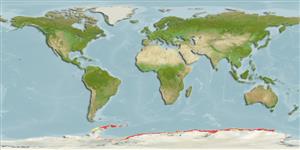Environment: milieu / climate zone / depth range / distribution range
ນິເວດວິທະຍາ
ສັດທະເລ ອາໄສຢູ່ໃກ້ໜ້າດິນໃຕ້ພື້ນທ້ອງນ້ຳ; ລະດັບຄວາມເລິກ 140 - 1405 m. Polar; 60°S - 78°S
Southern Ocean: East Antarctica (Ross Sea, Davis Sea, Queen Maud Land), South Shetland Islands and South Orkney Islands.
ຂະໜາດ / ນ້ຳໜັກ / Age
Maturity: Lm ? range ? - ? cm
Max length : 21.0 cm TL ຕົວຜູ້/ບໍ່ມີເພດ; (Ref. 5181); ນ້ຳໜັກສູງສຸດທີ່ເຄຍຈັດພີມມາ: 131.00 g (Ref. 124149)
Individuals over 10 cm SL feed primarily on mysids and to a lesser extent on isopods. Fish below 10 cm SL feed almost exclusively on gammaridean amphipods (Ref. 5181).
Life cycle and mating behavior
ການຈະເລີນເຕັມໄວ | ການສືບພັນ | ການວາງໄຂ່ | ໄຂ່ | ຄວາມດົກຂອງໄຂ່ປາ | ຕົວອ່ອນ
Eakin, R.R., 1990. Artedidraconidae. p. 332-356. In O. Gon and P.C. Heemstra (eds.) Fishes of the Southern Ocean. J.L.B. Smith Institute of Ichthyology, Grahamstown, South Africa. (Ref. 5181)
IUCN Red List Status (Ref. 130435)
Threat to humans
Harmless
Human uses
ການປະມົງ: ທີ່ບໍ່ມີຄວາມສົນໃຈ
ຂໍ້ມູນຕື່ມອີກ
ຊື່ສາມັນຄຳສັບຄ້າຍຄືກັນການເຜົາໃໝ້ພະລັງງານໂດຍປ່ຽນທາດອາຫານໃນຮ່າງກາຍໃຫ້ກາຍເປັນຊີ້ນແລະໜັງຜູ້ລ້າການສຶກສາຜົນກະທົບຂອງສານຜິດທີ່ມີຜົນກະທົບຕໍ່ລະບົບນິເວດການສືບພັນການຈະເລີນເຕັມໄວການວາງໄຂ່ການສັງລວມການວາງໄຂ່ຄວາມດົກຂອງໄຂ່ປາໄຂ່Egg development
ເອກະສານອ້າງອີງການລ້ຽງສັດນ້ຳຂໍ້ມູນການລ້ຽງສັດນ້ຳສາຍພັນກຳມະພັນElectrophoresesການຖ່າຍທອດທາງກຳມະພັນຈາກພໍ່ແມ່ຫາລູກພະຍາດການປຸງແຕ່ງNutrientsMass conversion
ຜູ້ຮ່ວມມືຮູບStamps, Coins Misc.ສຽງຫອຍມີພິດຊະນິດນຶ່ງທີ່ອາໄສໃນທະເລຄວາມໄວປະເພດການລອຍເນື້ອທີ່ເຫືອກOtolithsສະໝອງວິໄສທັດ
ເຄື່ອງມື
Special reports
Download XML
ແຫຼ່ງອີນເຕີເນັດ
Estimates based on models
Preferred temperature (Ref.
123201): -1.7 - 0.9, mean -0.5 °C (based on 552 cells).
Phylogenetic diversity index (Ref.
82804): PD
50 = 0.5000 [Uniqueness, from 0.5 = low to 2.0 = high].
Bayesian length-weight: a=0.00603 (0.00386 - 0.00941), b=3.25 (3.11 - 3.39), in cm total length, based on LWR estimates for this species & (Sub)family-body (Ref.
93245).
ຊັ້ນເຂດຮ້ອນ (Ref.
69278): 3.3 ±0.49 se; based on food items.
Fishing Vulnerability (Ref.
59153): Low vulnerability (11 of 100).
